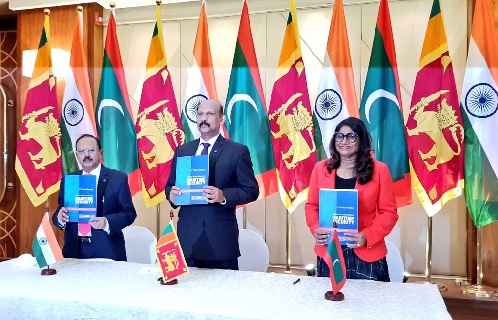The neighbouring countries, India, Sri Lanka and Maldives, have established a Secretariat for Trilateral National Security Advisors (NSA) on Maritime Security Cooperation on March 1 at the Sri Lanka Navy (SLN) Headquarters in Colombo. This fully-fledged new Secretariat is expected to operate 24/7, with monitoring of Chinese shipping in the area as one of its focal points. Speaking at the brief ceremony, the Foreign Secretary of Sri Lanka, Admiral Prof. Jayanath Colombage stated that the “entire world is benefitted with this initiative as the Indian Ocean is the lifeline of the entire world.” The Secretariat marks India’s rebooted activism in the Indian Ocean Region.
It also follows the Indian Ocean visit of External Affairs Minister, S Jaishankar, who had travelled to the Maldives, Mauritius and Seychelles.
Sri Lanka hosted the fourth NSA-level trilateral meeting on Maritime Security Cooperation with India and the Maldives last year on November 28 in Colombo while Bangladesh, Seychelles and Mauritius represented the meeting virtually as Observer States. In their meeting after six years, the top security leadership of Maldives, India and Sri Lanka had detailed discussions to expand the scope of their platform from a maritime focussed trilateral initiative to looking at common security threats and had decided to establish a full-fledged secretariat.
It was India’s NSA Ajit Doval’s initiative to revive the Indian Ocean troika with Sri Lanka and Maldives to promote “meaningful cooperation” in the Indian Ocean region on “maritime security”, as Beijing’s aggressive behaviour in the Indo-Pacific has caught global attention. Mauritius and Seychelles joined as observers through virtual mode. Doval’s strategy was to include “common security threats” of terrorism and extremism among other areas, and Sri Lanka’s Defence Secretary Maj Gen (Retd) Kamal Gunaratne and Maldives Defence Minister Mariya Didi readily agreed.
In the fourth edition of NSA Trilateral meeting was to broaden the scope from “maritime security to maritime and security”. The reference in the joint statement to the recognition of threats from radicalisation, terrorism and drug trafficking was a reflection of the enlargement of the agenda.
“The three countries also exchanged views on common security threats and agreed to broad base cooperation by expanding the scope to improve intelligence sharing and include issues like terrorism, radicalization, extremism, drugs, arms and human trafficking, money laundering, cyber security and effect of climate change on maritime environment,” said the joint press statement released after the meeting. The press release added that the “past deliberations and outcomes have helped the three countries in improving close coordination in maritime security of the region. These were supplemented by deputy NSA level meetings for sustained engagements and implementation of the discussions at the NSA level meetings”.
The NSA Trilateral was revived after six years as earlier meetings were held in 2011 in the Maldives, in 2013 in Sri Lanka, and in 2014 in India.
In the last meeting in 2014, there were observers from Seychelles and Mauritius. This time, the two Indian ocean nations again took part in the meeting, but virtually. Sri Lanka had also invited Bangladesh as an observer, but the senior official was indisposed.
This meeting was significant. Both Sri Lanka and the Maldives are critical maritime neighbours to India in the Indian Ocean region and there have been continuous efforts by both India and China to win friends and favors in Colombo and Male.
The NSA Trilateral talks are also a demonstration of the Indian intent to push sub regional diplomacy, which has been gaining traction in India’s foreign policy in the last few years. The Modi government has made efforts to engage in subregional diplomacy as a useful track following the near-complete halt in regional diplomacy in South Asia under the South Asian Association for Regional Cooperation (SAARC).
While broader maritime security, anti-piracy, and HADR are important components of the growing India-Sri Lanka-Maldives strategic narrative, the real worry for India is the growing Chinese activism in the Indian Ocean region. China’s efforts at cultivating the Indian Ocean littoral states have been a concern for New Delhi. In response, India has pursued many paths to build rapport with these neighbours, including bilateral, trilateral, and minilateral conversations in the region.
India has also entered into a series of partnerships with like-minded countries in the Indo-Pacific, such as Australia, Japan, and the United States, to offset the growing Chinese influence as well as to enhance India’s own capabilities. With the secretariat operating 24/7, the NSA Trilateral group will be tested in the coming months as Beijing makes its moves.




















